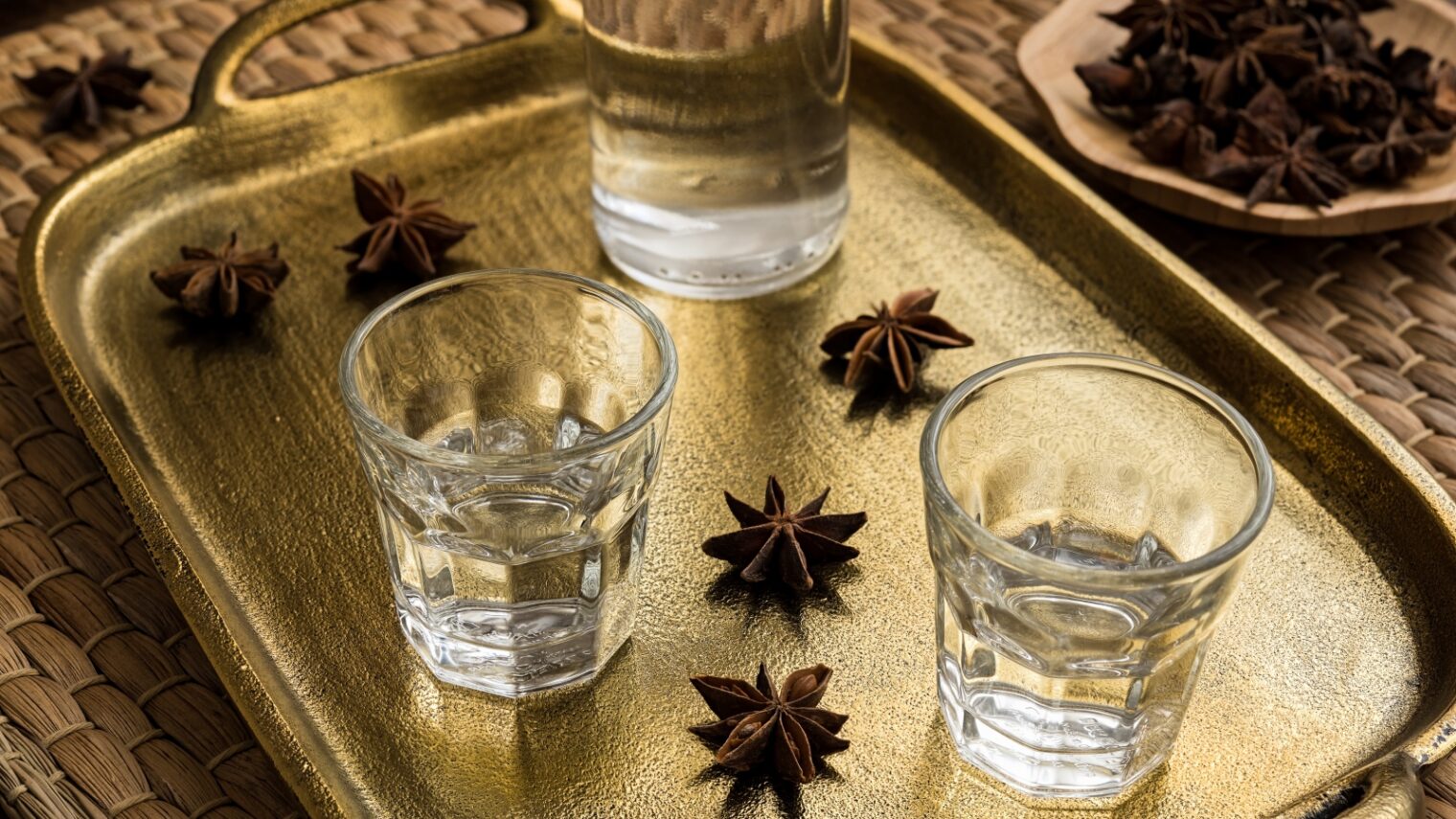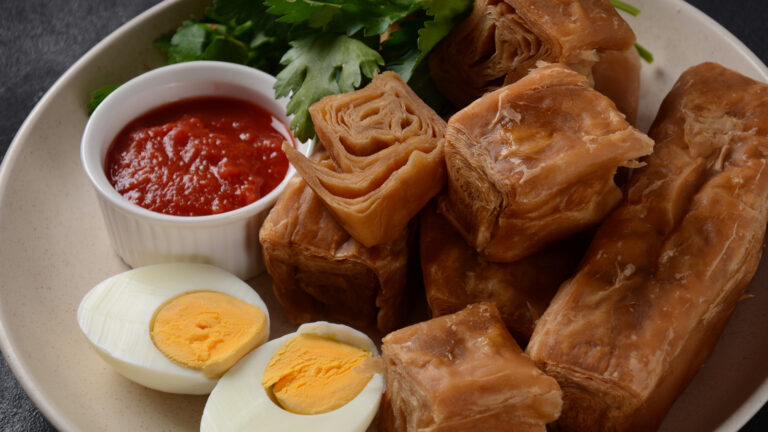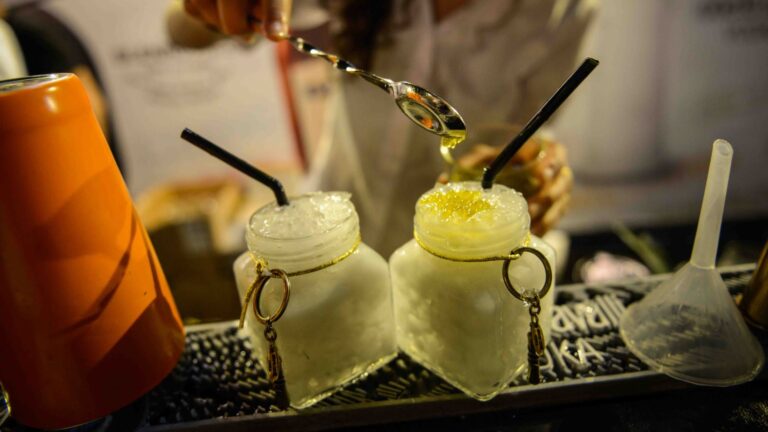“This is the best arak that can be found outside of Lebanon,” says Aziz Suidan, pointing to a bottle with a turquoise-and-gold label from Ramallah Distilleries that shows a woman carrying a basket filled with harvested grapes.
Suidan, the owner of Suidan Market in Haifa, a general store specializing in fine wines and specialty foods that has stayed in the family for an entire century, knows what he’s talking about.
He has been drinking Arak, a lingering sweet licorice drink that typically ranges between 50 and 65 percent alcohol by volume, all his life.
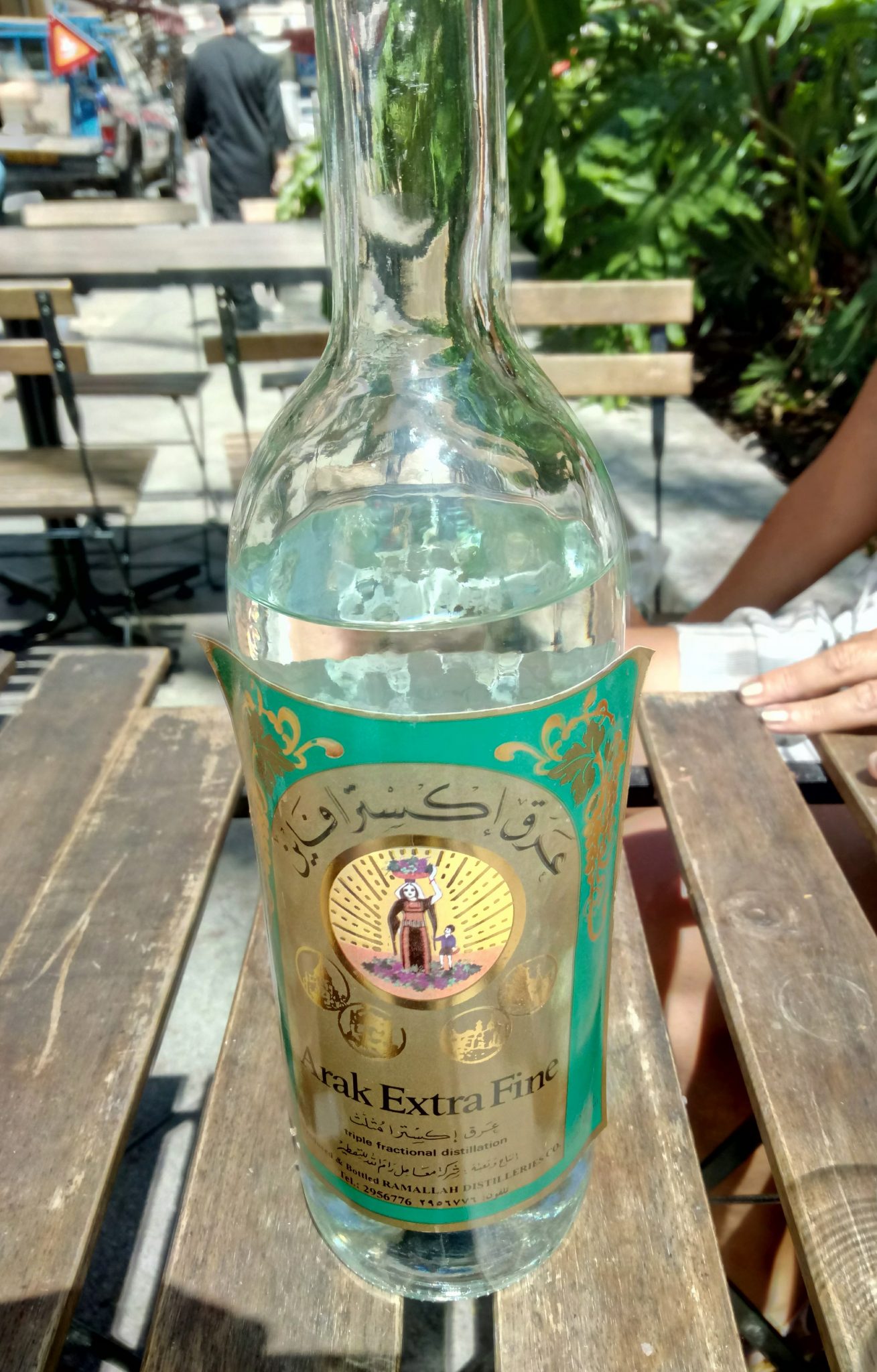
Arak is the traditional hard alcohol of choice in the ancient Levant region and throughout the Middle East in countries such as Iran and Iraq. Its cousins — raki, sambuca and pastis — are popular in other areas across the Mediterranean and Europe.
The liquor base in arak is made by fermenting the juice of figs or grapes, diluting with water, and flavoring with aniseed during several processes of distillation.
Once considered a drink of old Middle Eastern men playing backgammon, arak is now the chosen spirit of Israel’s young generation while also gaining popularity and respect among professionals, alcohol enthusiasts and Israel’s elite.
Popular these days in mixed drinks or in shots, high-quality arak is best slowly sipped chilled or at room temperature, alongside small appetizers and salads or as a digestif.
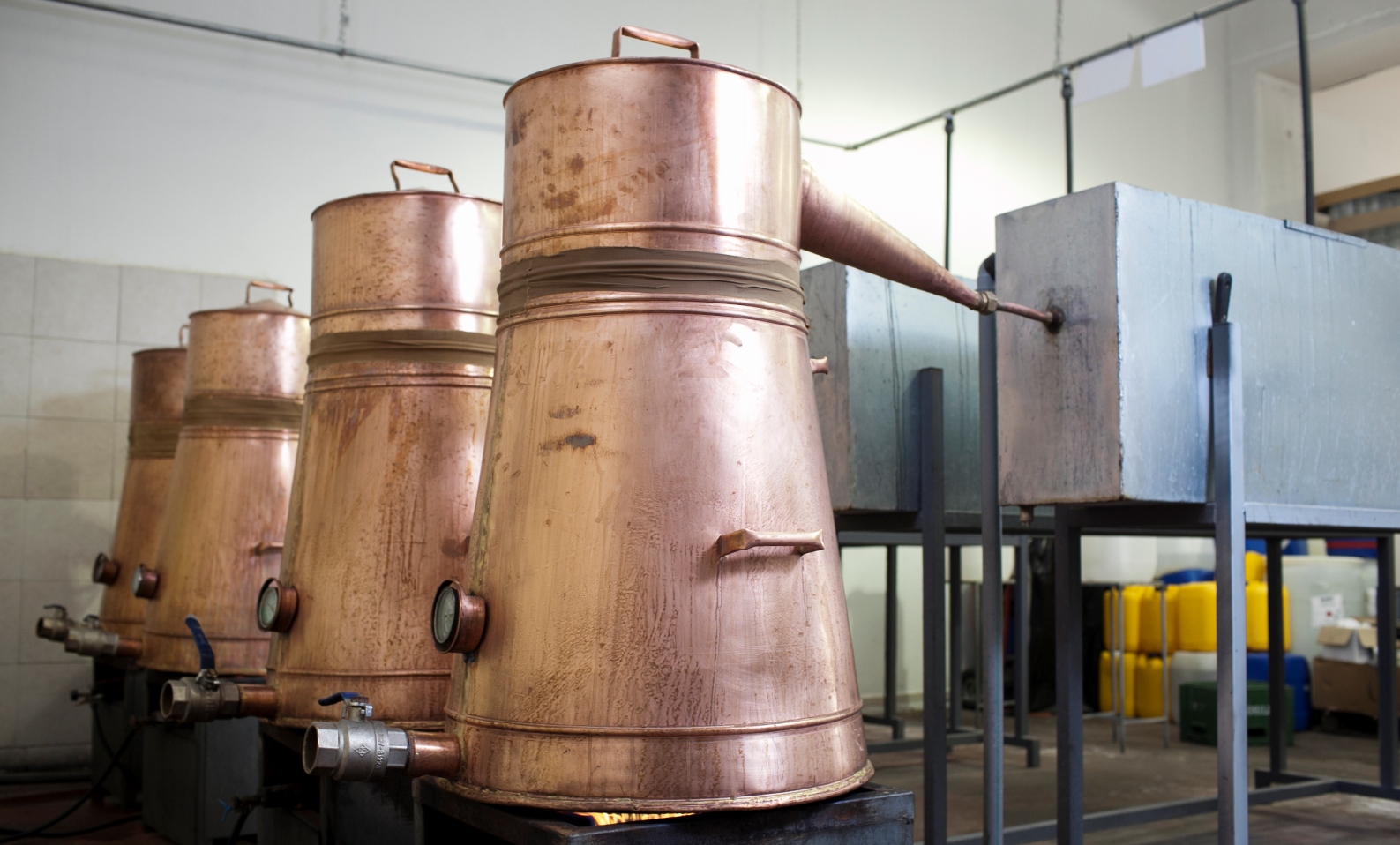
Haifa mixologist Andrey Frenkel, owner of the cocktail consultation service Six O’Clock, has a hand in reshaping the cocktail culture here.
“I think arak works really well in many classic cocktails that are traditionally made with different spirits. The ones on the fresher side, such as a Moscow Mule (vodka, ginger soda and lime) or a French Maid (cucumber, mint, cognac and sugar-cane liqueur with ginger and lime flavors) are great when the liquor is swapped out for arak,” Frenkel says.
Cap to right: Golan Heights Distillery’s Gold Label Arak. Photo: courtesy
Long gone are the days of the cheap Elite brand arak that Israelis like Frenkel grew up drinking. Israel is now buzzing with a handful of boutique arak producers. The trend comes hot on the heels of the global Greek food trend, which changed how people perceived anise-based liquors such as Greek ouzo, and their relation to fine dining and culture.
It also has come at a time that interest in honoring one’s own cultural roots has taken top priority, and amidst an overwhelmingly successful boom in Israeli craft beer, wine and spirit-making.
Renewed interest in the strong licoricey drink has allowed for arak producers and drinkers with a more refined and discerning palate to come to the forefront.
One such example is Matt Neilson of Pioneer Spirits, a sister distillery to the successful Buster’s Beverage Company in Beit Shemesh. Buster’s produces small batches of hard cider, hard lemonade and craft beer, while its artisanal distillery produces fine arak as well as gin, moonshine and apple brandy, which can be tasted on site and are sold in Israeli high-end liquor stores and delis as of January 2018.
According to Neilson, Pioneer arak possesses a strong aroma of fresh anise with caramel notes, a silky, creamy texture, extra-smooth back and a firm, yet not overwhelming, anise flavor.

Native Canadian David Zibell of the Golan Heights distillery is another artisan who has created unusual varieties of arak, which piggybacks off the whisky made here since 2014.
Golan Heights’ Gold Label Arak, which draws its color from a six-month aging process in the same charred barrels previously used to age the distillery’s whiskies, has a smooth finish, golden color and gentle oak flavor.
Zibell also makes Mah’ia, a Moroccan-style anise drink twice distilled from local dates and infused with green anise seed, fennel and star anise. The result is a drink with gentle anise flavor, a certain roundness, and balance from the date alcohol.
“When I drink arak I first look for a distilled arak,” Zibell tells ISRAEL21c. “Most supermarket arak is just alcohol flavored with artificial or natural anise flavors. They may be nice, but they are not the real deal. It’s all about the quality of the alcohol and the anise that was used, how it smells, how it ‘louches,’ or clouds up in the glass after adding cold water. Arak distilled with good anise will be very milky when mixed this way.”
Other Israeli arak-makers include Pelter Distillery, started in 2013 in the northern Golan wine region by Tal and Nir Pelter of Pelter Winery; and Arak Masada, an award-winning label started by brothers Jarise and Wadia Hadid in the Western Galilee village of Mi’ilya in 2013, made in the Lebanese style of their forefathers using Lebanese and Syrian products.
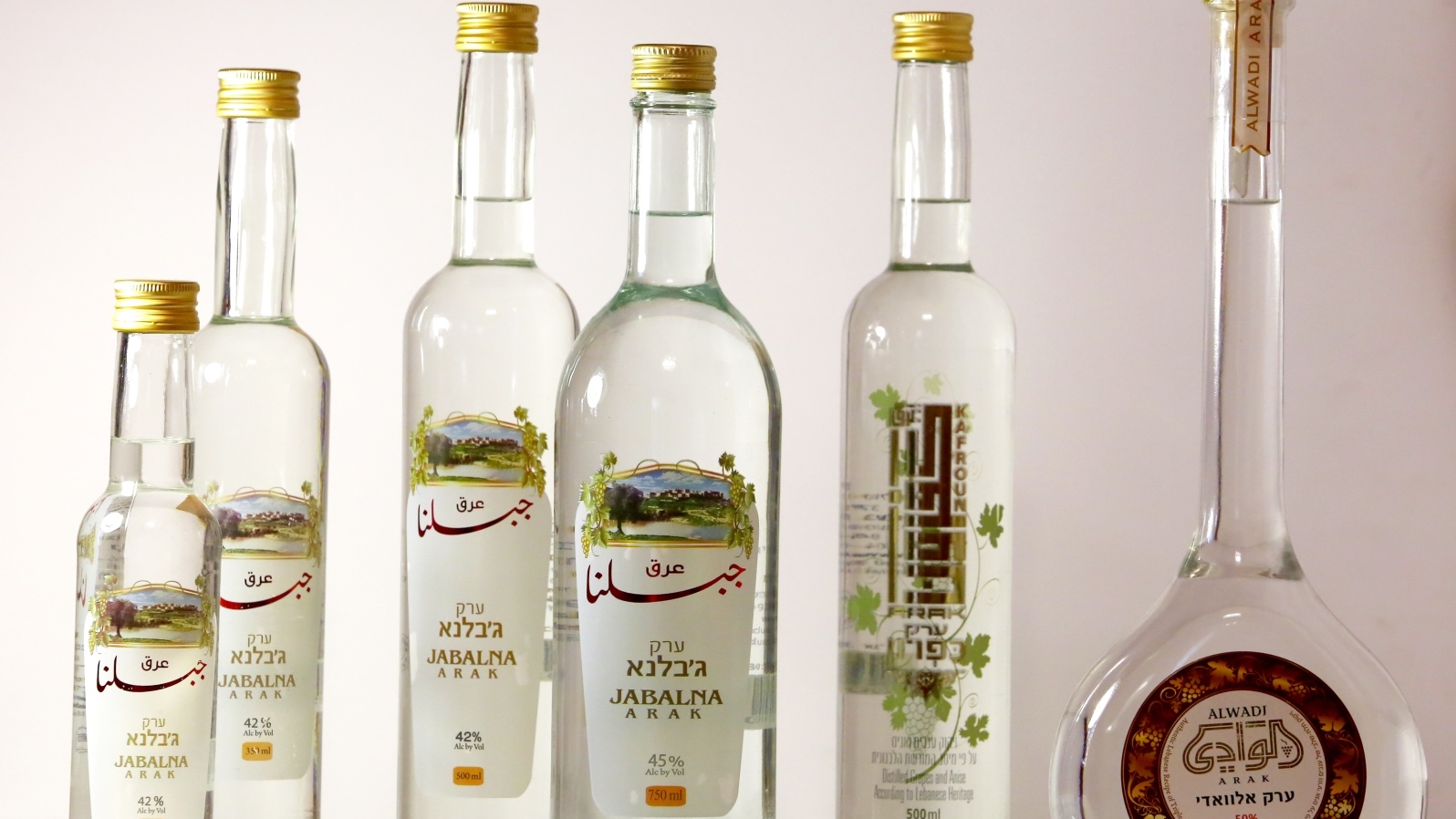
But not all araks beg to be taken so seriously. Other Israeli brands, such as, Malaki, Gat and Mabrouka, take a more relaxed approach, appearing in such flavors as bubble gum, vanilla cake and banana split.
“Craft distilleries are booming is Israel… consumers are more and more savvy and want to know what they are eating and drinking. I think it’s an exciting time for both consumers and producers,” says Zibell.

Neilson concurs that craft distilleries will be the next big boom in the Israeli culinary world and predicts it will be much larger than the current craft beer boom.
“This is thanks to the huge export potential of Israeli-made spirits,” he tells ISRAEL21c. “Regarding the local market, Israelis are lifestyle enthusiasts. Prices may scare them initially, but within no time craft spirits will be all the rage.”
Boutique arak brands we love
Traditional Lebanese-style arak
Arak Masada is internationally critically acclaimed, hails from the Western Galilee village of Mi’ilya and is strictly kosher.
Craft Israeli varieties
Pioneer Spirits brings an American flair to the Israeli spirits market with a refined arak that the local connoisseurs will love.
Golan Heights Distillery uses its knowledge of whisky-making to create a new kind of award-winning flavorful golden arak.
Pelter Distillery uses grapes grown in Ein Zivan in the Golan Heights for a classy boutique arak carrying notes of star anise, cinnamon and fennel.
Flavored varieties
Mabrouka is produced by a Moroccan-Israeli family in different tantalizing flavors such as mint and espresso. They also produce more rare types of arak made from the distillation of figs and dates, in celebration of their North African roots.
Arak Gat screams “fun” with flavors such as Tutti Frutti and Bazooka, transforming this very serious spirit into one with a sense of humor.
Arak Malaki-a.g.t.d.- Offering banana split and vanilla cake flavors, this boutique arak distillery is aptly named “angel” to commemorate an ancient Sumerian legend whereby angels were attracted to barrels of the distilling libation. This brand and its amusing flavors can be found in Israeli supermarkets and specialty stores.
Palestinian specialty arak
Ramallah Distilleries’ Arak Extra Fine and Ramallah Gold, found in Arab specialty markets across Israel, are seriously strong yet surprising smooth, and filled with sweet licorice candy flavor to be enjoyed alongside savory foods or even chocolate and desserts.




